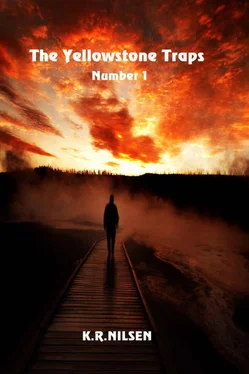But it was Friday and the YVO lab staff and researchers were leaving for watering holes at Jackson Hole and Cody. Liz decided to vacate the headquarters offices and try for the Park Point cabin for an overnight or two to pick up notes, data CDs and some other things that she had left behind on several trips to the outpost.
Wesley Couch paced about the halls outside his office, reluctant to pack for a scheduled trip to Washington, DC. He was agitated, blood pressure medicine doing little to relieve his tension. He was tormented by the devil of indecision. All the data, all the withering seismic activity pointed to the onset of volcanic activity. But the seismic signals were so diffuse and covered an area of such grand scale that neither Wesley, the YVO team nor university geo-lab personnel across the West could decide precisely where the greatest danger lay.
He and others thought it prudent to recommend a general volcano advisory, the first such warning ever issued. But he balked. What areas of the park should be closed? Should he insist the administrators shut down the park altogether? If he authored an advisory now, with the summer season approaching, there would be hell to pay internally, within the park hierarchy. There was sure to be fallout from the region’s governors and from the congressional troika. Who would be called on…?
“Wesley.”
Wesley’s startle response shook him like a sock in a puppy’s mouth, he was so taken aback by the sudden call of his name.
“Wes, there’s some trouble at Obsidian.”
The voice was that of Liz Embree.
“God, you scared me, Ms. Embree.”
“Sorry, Wes. Parks is looking for you.”
“What for?”
“There’s been an untimely death. Several, actually.”
Benjamin White Elk was road weary, his spinal ligaments stiff as cold highway tar at the end of a seven-hour drive south from the border country. He pulled his eighties-vintage GMC pickup into the lot beside the county nursing home in Livingstone, Montana. The severe rectangular building rambled across the prairie, its red brick facade unbroken by even a single decorative feature.
It was dinner hour at the nursing home. White Elk found his way to the dining hall and peered in. Under the flood of cheerless florescent lighting, the Blackfoot elder knew just where to look, across a sea of gray heads to the west corner, to a table that always captured the last rays of the setting sun at dinner. There he could see her, facing away from the room interior and out toward the prairie expanse. He could make out the features of his tiny mother, chewing her food in silence, watching the solar disc disappear into the folds of distant peaks.
White Elk crossed the room to the table where his mother sat. He seated himself without saying a word. For many seconds, the elder gazed at the profile of his centenarian mother. Great age served Native Americans well. The march of the years chiseled elaborate, sharp-edged features into the skin, valleys and ridges, canyons and steep slopes. Each reflected light or swallowed it up to create a face of stony contrasts. Fellow Native Americans saw these features as badges of wisdom, hard won and proudly displayed. To White Elk, it was an honor to be in the presence of his mother, a being who had lived a full century and whose grandparents had witnessed the Plains holocaust at the hands of white cavalry soldiers and land-hungry European immigrants.
Stretching his left arm, White Elk reached out to his mother and touched her lightly on the forearm. He said nothing. His mother did not turn to acknowledge her son’s touch, but a smile spread across her lips and she reached out with her right hand and placed it over his.
“Benjamin, my son,” said his mother very quietly.
“Hello, mother.”
The centenarian smiled yet sat as still as rock. “Benjamin.”
“Yes, mother.”
“I have a story to tell you.”
“You do, then?”
“Yes, I do. You must listen carefully. I have seen things.”
“Seen things? What is it you have you seen, mother?” White Elk asked softly.
The aged woman grasped the shawl about her shoulders and pulled it tight under her chin as if to ward off cold. Finally, she turned to look into the eyes of her son.
“Benjamin,” the old woman began in a voice little more than a whisper. “Your namesake visited me yesterday.”
“My namesake?”
“The white elk, Benjamin, the white ponoká, it came last evening while I ate dinner. It came to the window here.”
White Elk leaned forward to hear better, folding his hands before him.
“Last night, the earth moved again. It has moved many times now, many times since the fall. Last evening, the earth shook for a long time. Did you see the ceiling tiles? The cracks?”
“I did see, mother. The building has not done well.”
“Many tiles fell last night. Many of the people in the dining room were frightened. Some cried.”
“Yes, mother.”
“I did not. At the end of the shaking, a dozen ponoká came to stand by the building, right by the window where I was sitting. They were seeking shelter from danger, I think.”
“Yes, that could be.”
“The last one to come to the building was white, Benjamin. It was the great ponoká you saw as a young man.”
White Elk could see that his mother was completely serious. He had no doubt that she had seen what she said she had.
“Benjamin, the ponoká, the white one, he spoke to me. No one saw him but me and he spoke to no one but me. He spoke with his beautiful eyes.”
“What were his words, mother? Tell me.”
“The old man, Napiw, he is unhappy, said the ponoká. There is no bond between the earth and its people any longer, he said. There is no kinship between the people and the animals. People no longer respect the animals and no longer pay homage to the earth that suckled them and nurses them still.”
“The white one, it said all this to you, mother?”
“Yes, Benjamin, and much more. Much more.”
“Yes, go on.”
The aged matriarch turned to the window. She pointed out the glass to the south.
“Do you see the mountains, Benjamin?”
“Yes, of course, mother.”
“Do you see the valley between the mountains. The mountains follow the valley on both sides. Do you see?”
“Yes, mother.”
“The thunder in the earth, it comes from there, in the distance, in the valley between the mountains as far away as you can see.” She turned away from the window and looked her son in the eye. “The white elk, he said that he was fleeing the valley and going far away to the north. He was going to the ice country, where you live, Benjamin.”
“Why would he want to do that, mother?”
“This is why. This is what the white one told me. He said the mountains will rise up and touch the sky. The valley will turn over and disappear beneath the mountains. Then the mountains will fall down. This will happen soon, very soon.”
White Elk sat still. He did not think his mother’s words to be the rant of a withering mind. He knew his mother’s words to be true, always. Since his childhood, she had taught him that no honor would come to a Blackfoot who did not speak truthfully at every juncture. To speak an untruth would lead to the undermining of a man’s credibility. People would begin not to trust words and deeds, actions, everything. Honor would be lost forever.
“The ponoká, he said the sun will sink into the earth and not rise again. The land will burn and turn to dust. The people in the land, the white people who took our homelands, they will burn and turn to dust, too.”
“Do you say, mother, that all people will die? What will happen to our people?”
Читать дальше










